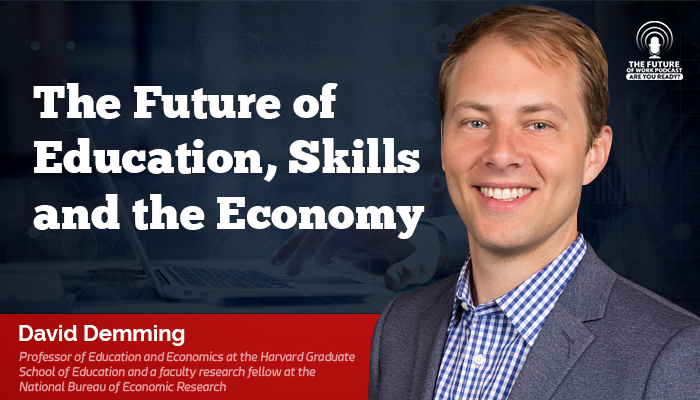Click Here to Subscribe via iTunes
Click Here to Subscribe via RSS Feed (non-iTunes feed)

What is in this episode and why you should care:
David Deming is the Professor of Public Policy, Education and Economics at the Harvard Graduate School of Education and a Faculty Research Fellow at the National Bureau of Economic Research. His research focuses broadly on the economics of education, with a particular interest in the impact of education policies on long-term outcomes other than test scores. Before becoming a professor at Harvard, David attended Berkeley and Ohio State University where he was trained as an economist. He has always been motivated by policy oriented questions and how economics can affect the real world.
When asked if there is a skills gap, Deming indicated that if you look back to the job market 30 years ago organizations would hire people with few skills but then they would invest in those people to train them on the job. They were willing to take a chance on the new graduates. Now, the jobs are more fluid, employers don’t want to pay to train employees and then have the employees leave a short time later. So we have people graduating from school without skills but people aren’t willing to invest in them – we don’t have the ‘connective tissue’ to pull the two together.
One idea, Deming pointed out, is to develop a European style of building durable partnerships between universities and employers to bridge the skill gaps. They can share the cost and effort.
On the topic of Universal Basic Income, Deming said it has some ‘appealing aspects’, and it is transparent and easy to understand. He also maintains that it does not discourage work and in fact, has some appealing aspects. People talk about it as a solution of the ‘technological unemployment’ (which Deming does not think will happen). Everyone gets the base amount of money – so if you want to earn a lot of money then this won’t help. It is different than welfare. Welfare is a work disincentive because we only will give it to you if you are poor. Universal Basic Income goes to everyone regardless of the amount of money they have.
Deming gave some advice to organizations. He says, don’t be afraid to take a chance on somebody who doesn’t come from the standard background – but might be good a fit for you.
His advice for individuals is to try to be good at two things that are not common together. For example, a good coder who is also good social skills will be in demand and provide more opportunities.
What you will learn in this episode:
What David sees for the future of higher education and whether or not traditional education institutions will exist in the future
The 90/10 gap in incomes
The role of AI and its impact on future jobs
Future job skill sets needed
What schools should be doing and whether or not they should look like a workplace
What skills should we learn in school and how quickly will they be obsolete
David’s view on the skills gap
My new book, The Employee Experience Advantage (Wiley, March 2017) analyzes over 250 global organizations to understand how to create a place where people genuinely want to show up to work. Subscribe to the newsletter here or become a member of the new Facebook Community The Future If… and join the discussion.
The post The Future of Education, Skills and the Economy appeared first on Jacob Morgan.



